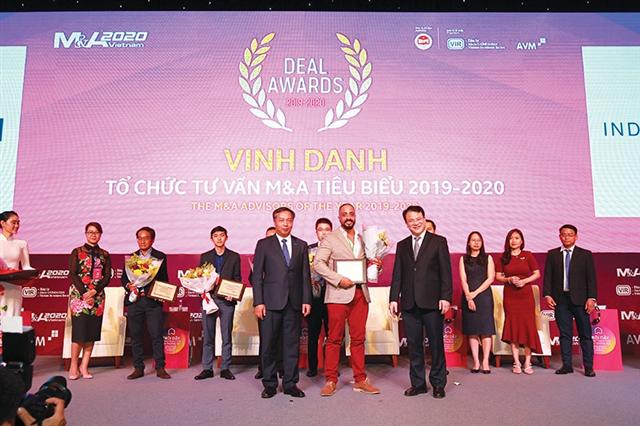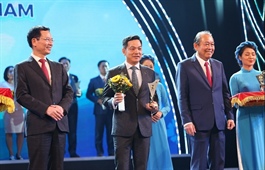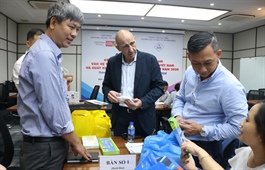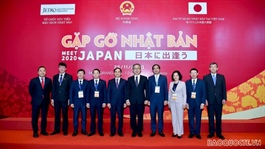Cross-border dealmaking bridging expectations
Cross-border dealmaking bridging expectations
Asia-Pacific and the continent as a whole has been and continues to attract a lot of foreign investment, having cemented its position as the region with the highest growth rates in the world, drawing in foreign investors and private equity funds by the droves.

Indochina Capital COO Michael Piro was honoured with a prestigious award at the Vietnam M&A Forum 2020, photo Le Toan
|
According to the Foreign Investment Agency under the Ministry of Planning and Investment, in the first eight months of 2020, over 4,800 instances of capital contribution and share purchases worth $4.93 billion were carried out in Vietnam. Overseas buyers have been responsible for 77 per cent of the total value of mergers and acquisitions (M&A) in the market.
A significant portion of these capital inflows has gone into real estate. Nonetheless, the average M&A deal value in Vietnam is still inferior to neighbours in Southeast Asia, including Malaysia, Thailand, and Singapore. Going back a few years, many foreign funds and corporations were setting up Asia-Pacific investment teams but many had to pull the brake on regional advancement as they were not able to finalise any deals.
A number of factors impede successful deals between enthusiastic foreign buyers and local owners with prime projects or sites, one of which is the understanding (or misunderstanding) of how culture influences the closing of a deal – this is especially true for public M&A. Strong, established sellers, experienced in dealing with foreign buyers and capable of settling the common legal concerns of foreign investors, should generally be approached in a more personalised manner, which underlines the importance of confidentiality, good timing, and the need for something beyond a broker introduction.
To drive a deal through the finish line, a newly-established investment team should seek consultants with actual experience and knowledge of deal execution procedures who have established tight connections with owners and are capable of directly negotiating with them.
Another reason cross-border investors struggle to find and close deals is their inability to expand, adapt, and stay flexible throughout the entire M&A process. Some acquirers have entered Vietnam with very specific requirements but strong, rigid procedures throughout the market have killed as many, if not more, potential deals as they make.
Ensuring that acquisitions align with strategies to reduce cancellation rates is a must for every acquirer but flexibility and a rich understanding of regional and town planning is also equally important to keep good opportunities from slipping away.
The accessibility of information to assess the feasibility and potential of a project is another obstacle for foreign buyers, especially in secondary markets. The language barrier and the fact that local authorities lack experience working with foreign investors make it difficult to access local market information such as the gross output of the locality, age pyramid of the local population, and most importantly the urban planning or regional planning of the area.
As such, it is essential that foreign buyers, especially those new to the market, engage a consultant based in Vietnam with a proven track record showcasing their network and understanding of the local culture. Consultants with a background in real estate development, active in both primary and secondary markets (Hanoi, Ho Chi Minh City, and Danang and their outskirts but also Haiphong, Vung Tau, and Quang Ninh, among others), can provide their market knowledge to optimise feasibility analyses and can help push actions and timelines forward through their relations with sellers and local authorities. One’s network and relations are key to the success of an M&A transaction, and this is perhaps more so in the context of Vietnam.
With the impacts of the pandemic, some buyers have been able to gain the upper hand as some vendors have been facing difficulties. “Distressed assets” has become a buzzphrase throughout the industry and some of the biggest names in private equity and real estate investment have established strategies to acquire a swath of these assets.
Many expect the first half of 2021 to be a transaction-rich period as vendors look to divest from their assets due to economic struggles from COVID-19. Two deals are never the same, each with its own priorities and dynamics. As past years have proven, bringing on locally-based consultants with a strong track record will certainly aid in identifying and eventually closing a successful deal, a fact further emphasised as cross-border travel has been disrupted by the pandemic.
By Michael Piro - COO, Indochina Capital

























